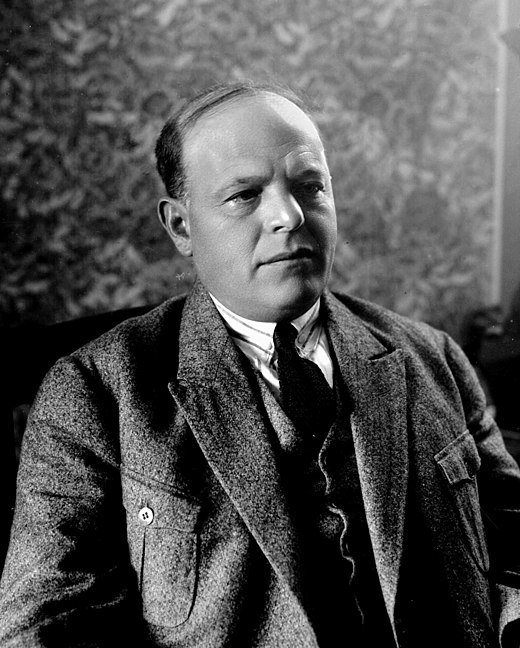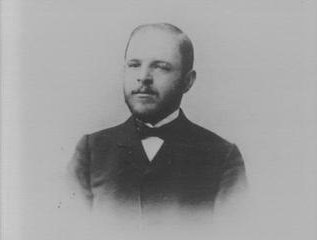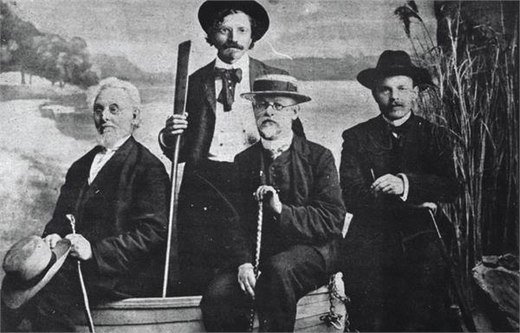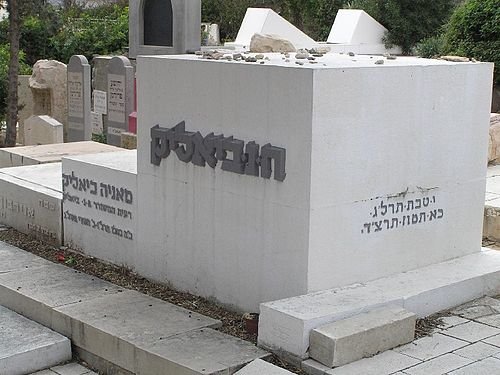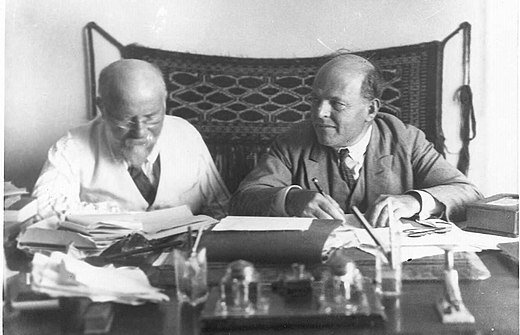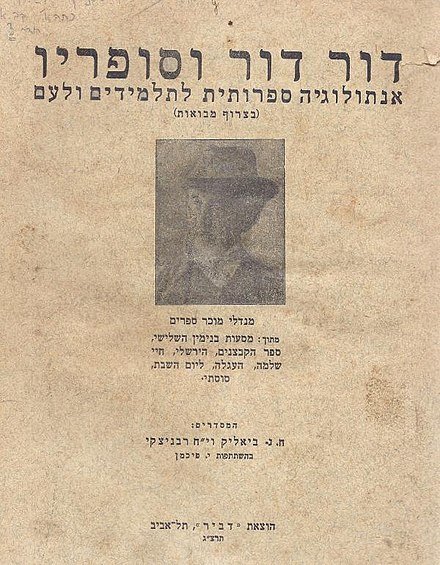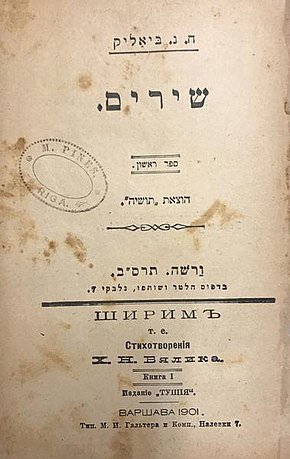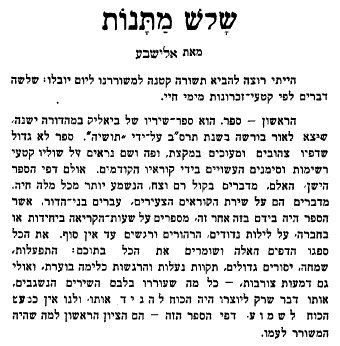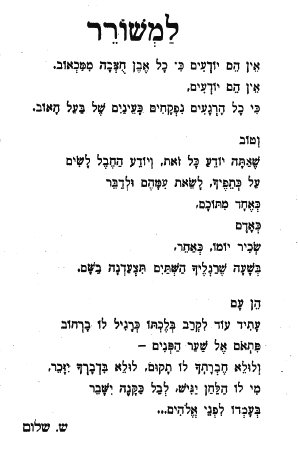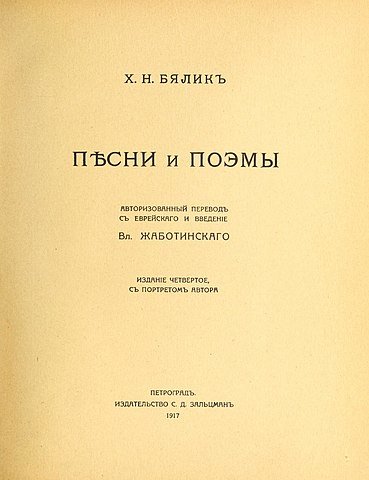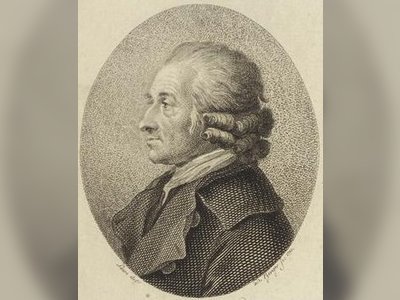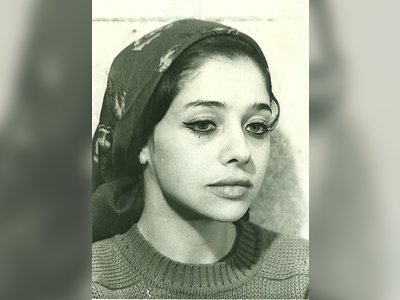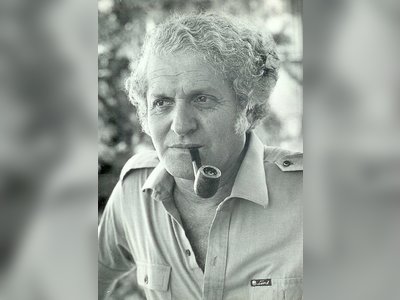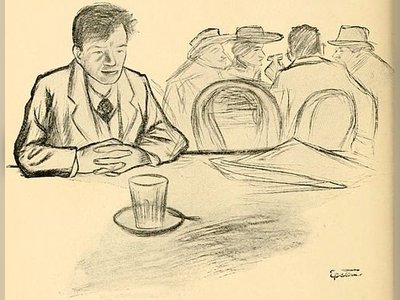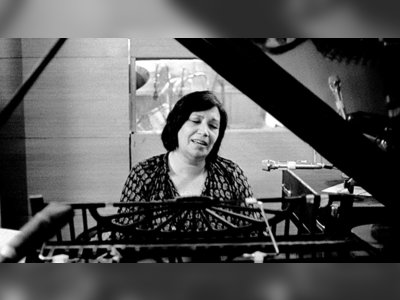מורשת גדולי האומה
בזכותם קיים
beta
Chaim Nachman Bialik: The National Poet of the Hebrew Renaissance
Chaim Nachman Bialik, born on January 9, 1873, in the village of Radi, in the province of Volhynia, which was then part of the Russian Empire (now in Ukraine), was a towering figure in modern Hebrew literature. He was a poet, writer, essayist, translator, editor, and influential cultural figure whose impact on modern Hebrew culture earned him the title of "the national poet."
Bialik's works have been translated into numerous languages, including English, French, German, Russian, Arabic (by Zakhai Aharon), and Yiddish.
Chaim Nachman Bialik was born to Dina Freiberg and Yitzhak Yosef Bialik. At the age of six, he moved with his parents to Zhitomir, where his father established a lumber business. However, Bialik's life took a significant turn when he lost his father and moved to live with his maternal grandfather, Yaakov Moshe Bialik. Despite his grandfather's dedication to Torah study, he allowed Chaim Nachman to pursue his literary talents, even though he faced jealousy and mistreatment from his cousins.
Bialik's experiences during this period, particularly in his grandfather's home, deeply influenced his later work, notably his cycle of poems titled "Yitmot" ("Dead Ones").
In 1890, at the age of 17, Bialik attended the Volozhin Yeshiva, led by Rabbi Naftali Zvi Yehuda Berlin (known as the Netziv). His primary motivation for joining the yeshiva was not to study Talmud but to gain a general education. However, he was disappointed to find that the yeshiva focused solely on religious studies. Despite this, Bialik became involved with a group of intellectually inclined students who engaged in secular studies and Zionist activities. Bialik quickly became a popular figure among these "enlightened" students, known for his deep knowledge of the Bible and Hebrew.
During his time at Volozhin, Bialik composed the poem "El HaTzipor" ("To the Bird") and was involved with the secret Zionist society "Netzach Yisrael," eventually leading to his departure from the yeshiva.
In the wake of a dispute between the students and Rabbi Berlin, Bialik left Volozhin, accompanied by over a hundred fellow students who escorted him to the Shatiporat train station. His departure was marked by the emotional poem "Ach Zocher Odeini Et-Kulkhem" ("I Still Remember All of You").
The hill from which he parted ways with his friends would later be named "Givat Bialik." His complex feelings about his time in Volozhin, marked by nostalgia and respect for the Torah scholars alongside bitterness and alienation from the traditional world, found expression in poems like "Al Saf Beit HaMidrash" ("At the Door of the Study Hall").
In 1892, Bialik arrived in Odessa, a center of Jewish enlightenment and culture in Southern Russia. Initially, he was wary of his grandfather's reaction if he settled in a place associated with secularism and enlightenment, so he kept his Odessa plans secret. However, Odessa eventually became his primary residence, where he lived from 1900 to 1921, except for a year in Warsaw in 1904. During this time, he produced most of his literary work.
Upon arriving in Odessa, Bialik initially stayed with Rabbi Avraham Yoel Ablowitz, who introduced his poetry notebook to L. Lilienblum. Lilienblum then recommended Bialik to the editor of "HaMelitz," Yehoshua Hana Ravnitzky, which marked the beginning of Bialik's involvement in journalism.
In 1893, due to family pressure, Bialik married Manya Averbuch, the daughter of a local lumber merchant from the nearby town of Korostyshiv. Despite their marriage, they never had children. During this period, Bialik wrote several pivotal works, including "Al Saf Beit HaMidrash" ("At the Door of the Study Hall"), "Meitei Midbar HaAcharonim" ("The Dead of the Last Wilderness"), and the poem "HaMatmid" ("The Diligent Scholar").
In 1899, Bialik moved to Moreshet, a settlement near Zikhron Ya'akov, together with his wife and her family. He worked as a teacher and continued writing poetry, including "Tzifirim," "Shirei," "Zohar," and "Mishirei HaChoref." His first poetry collection was published in 1901.
In 1902, along with Yehoshua Hana Ravnitzky, Shimon Ben-Zion, Elhanan Leib Lewinsky, and Meir Dizengoff, Bialik founded the publishing house "Moriah," which aimed to publish educational books in Hebrew.
In 1903, at the age of 30, Bialik wrote an autobiographical account upon the request of Professor Yosef Klausner. During this period, he also penned two of his most famous and controversial works, "Al HaShechita" ("On Slaughter") and "BeIr HaHaregah" ("In the City of Slaughter"). These works, published in the wake of the Kishinev pogrom, depicted the horrors and criticized the passivity of the Jewish victims, especially the men who prayed while their wives and daughters were raped. These poems were seen as a call for adopting values of courage and self-defense, as well as the need for a Jewish self-defense organization.
Bialik's poems resonated deeply with the public and were perceived as a call to action. They instilled a sense of urgency in the Jewish community, highlighting the need for self-defense and resilience in the face of violence.
Bialik's work served as a literary and cultural beacon during a transformative period in Jewish history, capturing the essence of the Jewish experience in the modern world. His enduring legacy as the national poet of Hebrew literature is a testament to his profound impact on Jewish culture and identity.
Early Life
Chaim Nachman Bialik was born to Dina Freiberg and Yitzhak Yosef Bialik. At the age of six, he moved with his parents to Zhitomir, where his father established a lumber business. However, Bialik's life took a significant turn when he lost his father and moved to live with his maternal grandfather, Yaakov Moshe Bialik. Despite his grandfather's dedication to Torah study, he allowed Chaim Nachman to pursue his literary talents, even though he faced jealousy and mistreatment from his cousins.
Bialik's experiences during this period, particularly in his grandfather's home, deeply influenced his later work, notably his cycle of poems titled "Yitmot" ("Dead Ones").
Education and Early Literary Career
In 1890, at the age of 17, Bialik attended the Volozhin Yeshiva, led by Rabbi Naftali Zvi Yehuda Berlin (known as the Netziv). His primary motivation for joining the yeshiva was not to study Talmud but to gain a general education. However, he was disappointed to find that the yeshiva focused solely on religious studies. Despite this, Bialik became involved with a group of intellectually inclined students who engaged in secular studies and Zionist activities. Bialik quickly became a popular figure among these "enlightened" students, known for his deep knowledge of the Bible and Hebrew.
During his time at Volozhin, Bialik composed the poem "El HaTzipor" ("To the Bird") and was involved with the secret Zionist society "Netzach Yisrael," eventually leading to his departure from the yeshiva.
In the wake of a dispute between the students and Rabbi Berlin, Bialik left Volozhin, accompanied by over a hundred fellow students who escorted him to the Shatiporat train station. His departure was marked by the emotional poem "Ach Zocher Odeini Et-Kulkhem" ("I Still Remember All of You").
The hill from which he parted ways with his friends would later be named "Givat Bialik." His complex feelings about his time in Volozhin, marked by nostalgia and respect for the Torah scholars alongside bitterness and alienation from the traditional world, found expression in poems like "Al Saf Beit HaMidrash" ("At the Door of the Study Hall").
Odessa Years
In 1892, Bialik arrived in Odessa, a center of Jewish enlightenment and culture in Southern Russia. Initially, he was wary of his grandfather's reaction if he settled in a place associated with secularism and enlightenment, so he kept his Odessa plans secret. However, Odessa eventually became his primary residence, where he lived from 1900 to 1921, except for a year in Warsaw in 1904. During this time, he produced most of his literary work.
Upon arriving in Odessa, Bialik initially stayed with Rabbi Avraham Yoel Ablowitz, who introduced his poetry notebook to L. Lilienblum. Lilienblum then recommended Bialik to the editor of "HaMelitz," Yehoshua Hana Ravnitzky, which marked the beginning of Bialik's involvement in journalism.
In 1893, due to family pressure, Bialik married Manya Averbuch, the daughter of a local lumber merchant from the nearby town of Korostyshiv. Despite their marriage, they never had children. During this period, Bialik wrote several pivotal works, including "Al Saf Beit HaMidrash" ("At the Door of the Study Hall"), "Meitei Midbar HaAcharonim" ("The Dead of the Last Wilderness"), and the poem "HaMatmid" ("The Diligent Scholar").
The Moreshet Years
In 1899, Bialik moved to Moreshet, a settlement near Zikhron Ya'akov, together with his wife and her family. He worked as a teacher and continued writing poetry, including "Tzifirim," "Shirei," "Zohar," and "Mishirei HaChoref." His first poetry collection was published in 1901.
In 1902, along with Yehoshua Hana Ravnitzky, Shimon Ben-Zion, Elhanan Leib Lewinsky, and Meir Dizengoff, Bialik founded the publishing house "Moriah," which aimed to publish educational books in Hebrew.
In 1903, at the age of 30, Bialik wrote an autobiographical account upon the request of Professor Yosef Klausner. During this period, he also penned two of his most famous and controversial works, "Al HaShechita" ("On Slaughter") and "BeIr HaHaregah" ("In the City of Slaughter"). These works, published in the wake of the Kishinev pogrom, depicted the horrors and criticized the passivity of the Jewish victims, especially the men who prayed while their wives and daughters were raped. These poems were seen as a call for adopting values of courage and self-defense, as well as the need for a Jewish self-defense organization.
Bialik's poems resonated deeply with the public and were perceived as a call to action. They instilled a sense of urgency in the Jewish community, highlighting the need for self-defense and resilience in the face of violence.
Bialik's work served as a literary and cultural beacon during a transformative period in Jewish history, capturing the essence of the Jewish experience in the modern world. His enduring legacy as the national poet of Hebrew literature is a testament to his profound impact on Jewish culture and identity.
- חיים נחמן ביאליקhe.wikipedia.org
